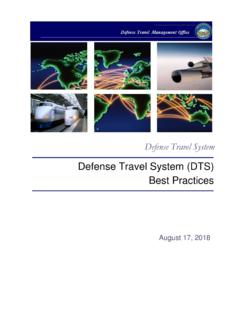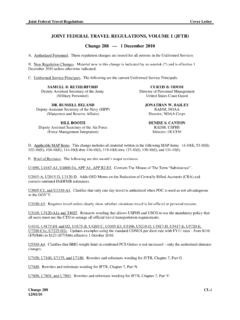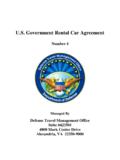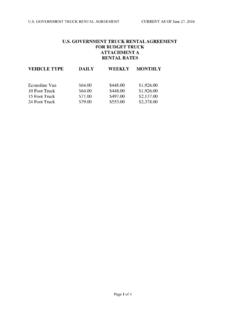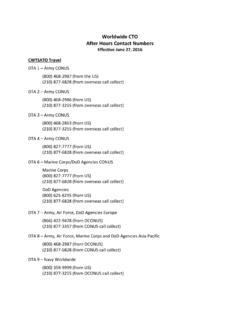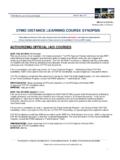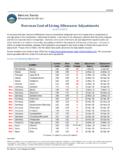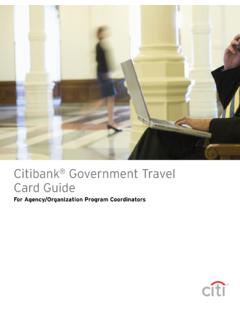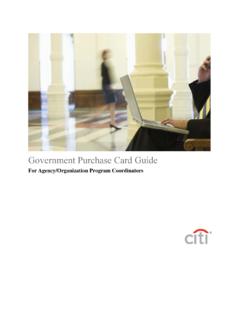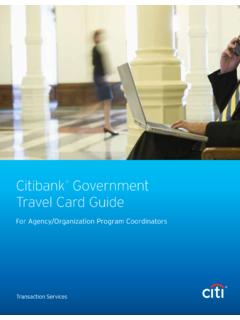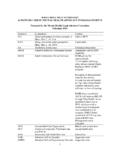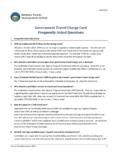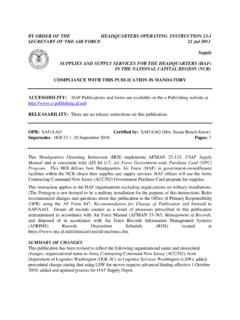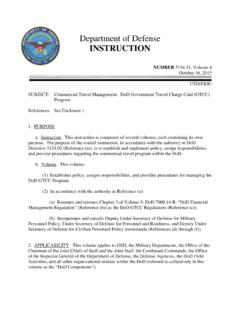Transcription of This page is left blank intentionally
1 Government Travel Charge Card Program agency Program coordinator guide February 2017. DEFENSE TRAVEL MANAGEMENT OFFICE. This page is left blank intentionally APC guide February 2017. Table of Contents Chapter 1. Introduction .. 1. Acronyms and Icons .. 1. Chapter 2. Laws, Regulations, and Policy Governing the DoD Travel Card Program .. 2. Chapter 3. GTCC Program Roles and Responsibilities .. 4. General Services Administration (GSA).. 4. Defense Travel Management Office (DTMO) .. 4. Component Program Manager (CPM) .. 4. agency Program coordinator (APC).. 4. Cardholder (CH) .. 6. Chapter 4. Charge Card Accounts .. 8. Individually Billed Accounts (IBAs) .. 8. Centrally Billed Accounts (CBAs) .. 8. Chapter 5. Hierarchical Structure .. 10. Chapter 6. Training Requirements .. 11. 11. Travel Explorer (TraX) .. 11. Citi Training and 11. Chapter 7. Citi Tools .. 12. 12. CCMS .. 13. CCRS .. 14. 15. Chapter 8. Operational Setup .. 16. New Account Applications and Setup.
2 16. Post Application Processing Actions .. 18. Chapter 9. Account Maintenance .. 19. Defense Travel System Reports .. 19. Demographic Updates .. 19. Temporary Credit Limit 19. Activating and Deactivating Accounts .. 20. Mission Critical .. 20. Hierarchy Transfers .. 21. Disputes /Transfers .. 21. i APC guide February 2017. APC Termination of 22. Deceased Cardholder .. 23. Credit Balance Refunds .. 24. Chapter 10. Delinquency Management .. 25. Overview .. 25. Delinquency 26. Fees .. 28. Delinquency Management Reports .. 29. Cardholder Payment Options .. 29. Chapter 11. Misuse .. 31. Visa IntelliLink .. 32. Chapter 12. Account Services .. 33. Upgrade .. 33. Reinstatement of Cancelled Accounts .. 33. Renewals .. 34. Lost/Stolen .. 34. Chapter 13. Additional Resources .. 35. Citi Customer Service and Support - Cardholders .. 35. Client Account Specialist (CAS) Support - APCs .. 35. CitiManager (Resources/Forms Links) .. 35. Travel Assistance Center (TAC).
3 35. Additional 35. ii APC guide February 2017. Chapter 1. Introduction This document provides agency Program Coordinators (APCs) with a general overview and guidance on processes and procedures necessary for the successful execution and daily operations of their Organization's Government Travel Charge Card (GTCC) Program. It includes information on the administration of both Individually Billed Accounts (IBAs) and Centrally Billed Accounts (CBAs). Should this document's content differ from the Component-specific materials, contact a higher level APC or Component Program Manager (CPM) for guidance. Note: Although all DoD Travel Card stakeholders will find value in this document, this guide is principally intended for Department of Defense (DoD) GTCC APCs, therefore the word you implies APC . Denotes especially important information or helpful tip. Acronyms and Icons Below are common DoD GTCC Acronyms that will be used in this guide and in the administration of the GTCC.
4 Program. Acronym Description Acronym Description APC agency Program coordinator DTS Defense Travel System BIN Bank Identification Number EAS Citi's Electronic Access System BP Basis Point GSA General Services Administration CAS Client Account Services (Citibank) GTCC Government Travel Charge Card CBA Centrally Billed Account HL Hierarchy Level CBA-S Centrally Billed Account Specialist IBA Individually Billed Account CBR Credit Balance Refund MC Mission Critical CCMS CitiDirect Card Management System MCC Merchant Category Code CCRS Citibank Custom Reporting System PCS Permanent Change-of-Station CCV Charge Card Vendor POS Point of Sale CLASS Citi Commercial Card Learning and System Support RPP Reduced Payment Plan CPM Component Program Manager SO Salary Offset CVV Card Verification Value SoU Statement of Understanding DFAS Defense Finance and Accounting Service SP2 SmartPay 2. DoD Department of Defense TMC Travel Management Center DPB Days Past Billing TO Transportation Officer DTA Defense Travel Administrator TraX Travel Explorer DTMO Defense Travel Management Office WBT Web Based Training 1.
5 APC guide February 2017. Chapter 2. Laws, Regulations, and Policy Governing the DoD Travel Card Program It is recommended that you become familiar with the laws and regulations upon which DoD GTCC Policies are founded: Public Law 105-264 The Travel and Transportation Reform Act (TTRA) of 1998. Mandates use of the GTCC by Government civilian and military personnel for official travel. Public Law 109-115 Section 846. Requires each Organization to evaluate the creditworthiness of an individual before issuing an IBA GTCC. Public Law 112-194 Government Charge Card Abuse Prevention Act of 2012 SEC 3. Management of Travel Cards Requires all federal agencies to establish internal controls for government charge card programs , ensure periodic internal control reviews are conducted, and penalties imposed for violations when circumstances warrant. Public Law 107-314 Section 2784 of the Bob Stump National Defense Authorization Act for Fiscal Year 2003.
6 Requires split disbursement of travel reimbursement directly to the GTCC vendor, and allows the withholding of funds (through Salary Offset) payable to a DoD employee when in debt to the GTCC vendor. Title 10 2784a Management of travel cards Provides for disbursement of travel allowances directly to creditors. Joint Travel Regulations (JTR). Pertaining to per diem, travel and transportation allowances, relocation allowances, and certain other allowances of Uniformed Service Active Duty members, Uniformed Service Reserve Component members, DoD. civilians, and civilians traveling on DoD funding. Only expenses authorized by the JTR should be charged to the GTCC, unless specifically allowed per the GTCC Regulations authorized by DoDI , Volume 4. Government Travel Charge Card Regulations Authorized by DoDI , Volume 4, (formerly the DoD. Financial Management Regulation (FMR) Volume 9, Chapter 3, provides GTCC policy, program structure, and APC responsibilities.)
7 Office of Management and Budget (OMB) Circular A-123, Appendix B. Prescribes policies and procedures regarding how to maintain internal controls that reduce the risk of fraud, waste, and error in government payment solution programs . charge-card- programs 2. APC guide February 2017. OUSD Memo, 3 May 2007 Reduction of Centrally Billed Accounts Approved the IBA as the primary payment mechanism for all travel costs. 3. APC guide February 2017. Chapter 3. GTCC Program Roles and Responsibilities General Services Administration (GSA). The GSA awards and administers a Master Contract, for the SmartPay charge card products and services for Purchase, Travel and Fleet. The current Master Contract for SmartPay2 expires November29, 2018. Defense Travel Management Office (DTMO). The DTMO, on behalf of the DoD, awards and manages a tailored task order defining the Department's requirements for Travel card products and services. The DTMO represents the Department's Travel Card interests with all sectors of the Government and Industry, to include the Services' and Defense Agencies'.
8 Component Program Managers, OSD-Comptroller, DoDIG, Office of Management and Budget, GSA, and DoD's contracted bank (currently Citibank). Component Program Manager (CPM). The Component Program Manager (CPM) serves as the primary administrator for their Service or agency and must be designated in writing. Minimum CPM responsibilities include: o Maintaining their component's organizational hierarchy structure. o Notifying the DTMO and the travel card contracted bank of any changes affecting their program organization ( , hierarchy). o Conducting periodic reviews (see GTCC Regulations, Annex 9 for a compliance checklist) to ensure: travelers submit travel vouchers within five days of completion of official travel and comply with split disbursement requirements; IBAs and CBAs are properly approved; credit limits are adjusted/appropriate to meet mission requirements; unused accounts are closed; the APC is part of the checkin/checkout process; APCs are running and analyzing the GTCC reports to assist in program management; APCs are following procedures to notify delinquent cardholders and suspected misuse, abuse, or fraud; maximum utilization of the travel card.
9 And APCs report findings of significant weaknesses to the CPM and Command or agency Head. APCs, from a hierarchical prospective, receive their GTCC Program guidance from their Component's CPM. agency Program coordinator (APC). The APC must be designated in writing by their Organization's Commander or Director. Some APC tasks must be performed at least once per billing cycle, but best-practice recommends more frequent attention to some specific areas of the program. To assist you with keeping track of these tasks and their recommended frequency, see below. APC Self Maintenance Prohibition: APCs that are also cardholders are not authorized to perform account maintenance such as activating or deactivating or making credit limit adjustments on their own IBA. If an APC/cardholder needs APC functions performed on their IBA, they must direct the request to a higher level APC or CPM. 4. APC guide February 2017. As-Necessary Tasks Collect and review required cardholder documentation prior to card issuance; signed application, Statement of Understanding, and Travel Card 101 certificate of completion Self-register your APC profile in CitiManager (Citi's online tool).
10 Remind cardholders to register in CitiManager when their account application is approved Proactively communicate with IBA cardholders and CBA managers to minimize account delinquencies Process CBA applications with required approval needed from your CPM. Respond promptly to cardholder inquiries Maintain (add, update/modify, remove) APC and cardholder profiles in the GTCC EAS for individuals within your span of control Facilitate cardholder moves between GTCC organizational hierarchies Activate and deactivate restricted accounts based on authorized travel dates Adjust IBA credit limits as necessary for the travel mission Place IBAs in Mission Critical PCS Status or Mission Critical Status as applicable (per Component guidance) and supervisor justification Work with DTS DTAs to ensure travelers on long term TDY are setup for Scheduled Partial Payments (SPPs). Adjust CBA credit limits, as necessary, for the travel mission Request CBA exceptions through the CPM, as needed Daily Tasks Process Account (IBA & CBA) applications within 24-hours of receipt Process cardholder requests to: activate/deactivate restricted accounts, increase IBA credit limits, place accounts in PCS Mission Critical status, Mission Critical status, update demographic information, etc.
